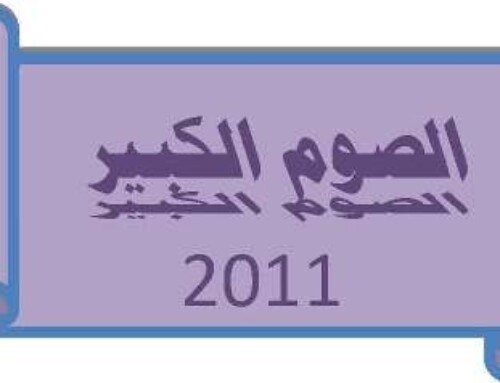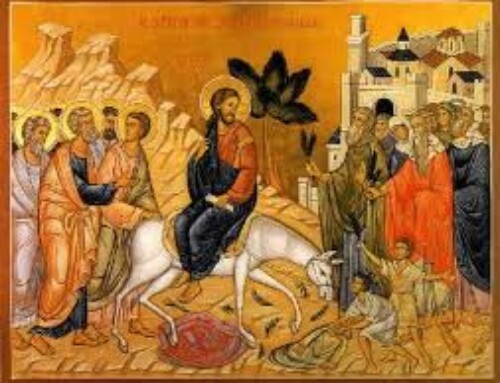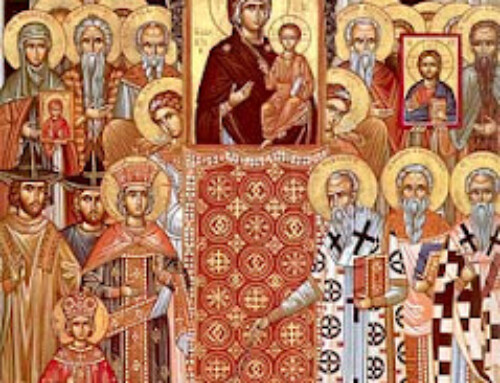Word Magazine March 1976 Page 10-11
“WE ARE ONE . . . OR ARE WE?”
Sermon Delivered by
Very Rev. Boris T. Geeza, Commander USN
Year after year, on the first Sunday of Great Lent, our Orthodox Churches throughout America gather together our parishioners and congregate at one of our large parish churches or cathedrals for the celebration of the Triumph of Orthodoxy Service in commemoration of the 7th Ecumenical Council which allowed the use of icons in our churches.
We are at such an auspicious liturgical occasion this year. We have gathered to declare our unity in faith and our oneness as Orthodox Christians, because although the Sunday of Orthodoxy originally was related to the significance and the honor of the usage of icons as a means and help to worship, it now has the deeper meaning of a reconstruction, rededication, and resanctification of ourselves to that true faith of Orthodoxy once delivered to the Saints.
As I ponder the significance of the celebration, I feel a deep ambiguity — a dividedness — and I feel that I must challenge the congregation to whom I am speaking. What I want to say needs to be said, yet I do not want to, or desire to, or intend to harm or hurt, but out of love for God, my Church, and you, want to be as constructive and positive as I can. Surely, we emphasize the Triumph of Orthodoxy because this is the day to do it; this is the first Sunday in Lent. We ALWAYS do this the First Sunday in Great Lent, do we not? It’s traditional, it’s expected, IT’S NICE, and we want and feel we NEED to pat ourselves on the back, to say how wonderful is our Faith, WHICH IT CERTAINLY IS, and how wonderful we Orthodox Christians are for being chosen, or for choosing, this magnificent doctrine, practice and belief.
We love the pomp and ceremony of the service, the icons, the vestments in various hues and colors, the incense, the candles, as well as the various national groups and diverse languages, all in order to SHOW, perhaps ourselves MORE than anyone else, that AT LEAST EXTERNALLY we are One.
He wants us to act upon our beliefs. He wants a unity of purpose, and an action of love; He wants fulfillment of his purpose to evangelize and revolutionize the mind, the heart, the soul of man in all of the ways of his life, so that man can be truly a servant of the Most High, and to have dominion over all that He has created. We are to transform all that exists into God’s paradise; this requires a personal effort, as well as a collective effort.
SHORTCOMINGS
Frankly and generally speaking, I can’t see this happening as often as I would like to see amongst our Orthodox Christians. Frankly, I see a great deal of action, but little meaning; externalism, without inner conviction; words, few deeds; lip service and little sincerity; good intentions, and no follow through; a lot of smoke, but not enough fire!
Of course, I may be over critical; there may be many reasons for this. But we can make all kinds of excuses for ourselves and place so many barriers in our ways that we fail to accomplish any real purpose because we fail to venture on that conviction of faith which we possess and which we gather to declare and affirm at this very service.
In this area, our Orthodox peoples are perhaps united as closely as any Orthodox people in our nation. But the unity which we show by such services as this one, does not fulfill completely the unity that we should strive to seek, that which is fully meant when our Lord says: “THAT WE MAY BE ONE!”
We are one in faith, in doctrine, in teaching — but we are not united organically nor canonically. I have been a priest for almost 27 years. I remember my first Sunday of Orthodoxy as a priest in Weirton, W. VA. where we gathered as we have gathered at this service. Many Orthodox priests of various nationalities and jurisdictions were present, proclaiming our unity in faith, doctrine, teaching. But something was lost; administratively and canonically we were not one, and I could not see why not! And I still do not see why not, 27 years later! After six years in a parish, I went into the chaplaincy of the US Armed Forces. I felt my mission to serve all Orthodox people regardless of jurisdiction or ethnic origin. I don’t like a ghetto situation in which I serve only a segmented part of Orthodoxy. I felt I wanted to serve God and the Church with a capital “C” and do, and pray God to continue to do so in the future. However, I would feel a great comfort and greater unity of purpose if my Orthodox bishop were of any race or color or ethnic background as long as he was validly consecrated in the Apostolic Succession of the Holy Orthodox Church hierarchy, and as long as he was united in a Holy Synod of Orthodox Bishops of the One, Holy, Catholic and Apostolic Church in America. This is certainly possible, and I cannot see why it cannot be so.
GAMES WE PLAY
We Orthodox people play too many games with our origins.
We are too proud of our separations rather than humble in our unity.
We forget our destiny is in God here in this land, and we stay separated canonically when in fact, I truly believe, all want to really be united. And this does not mean UNIFORMITY, but UNITY of the CHURCH because it is the true faith, universal, all-embracing and catholic in its tradition and faith — the Orthodox Church in its fullness. This doesn’t mean giving up a thing; it means acquiring everything! Wouldn’t it be wonderful, for example, next year to gather together for the Divine Liturgy on the Sunday of Orthodoxy where all of us could commune from the same chalice because we have a canonical unity in our all embracing Faith!
Problems Would be Solved
So much effort is expended in doing the work of the Lord in separated, individual ways; we could unite our educational efforts, our missionary efforts, our administrative efforts. Across this great land, if we united canonically and administratively to evangelize and expand our missionary efforts, the Orthodox Church could develop parishes in every large area: one bishop in one area or city; one missionary fund for the economical and educational support of firebrands of priests to bring the sword of Christ’s teachings and the crown of His salvation to multitudes who are looking for a stable faith, a viable and a true worship, for the truth in its fullness. Educational efforts can be localized and broadened and emphasized with a united effort and conviction. A struggling parish could be helped financially by a larger parish, because all are God’s people, in One canonically unified Church.
So, I throw out these thoughts to you, my dear brothers and sisters in Christ. I present them to you, because all great efforts come through the conviction of persons just like you and me. Surely, there are many problems involved, but they get no bigger when they are faced; let’s face them — the liturgical problems, the educational problems, the parish building problems, the missionary efforts, the canonical problems, the administrative problems.
But let us make an effort to do this in unity — in the Church as One, not separated into small, independent, linguistic, ethnic groups. When our individual hierarchs see that we do what we say, and mean what we do, they will give their blessings and unite us all.
Father Geeza was Dean of the Eastern Orthodox Military Chaplains, and a former Commander in the USN.
But there is an ambiguity in my own mind because I feel that Our Lord and Savior Jesus Christ, whom we worship and declare to be that salvation, wants more from me and from you — from US — than just a display of externalisms; He wants more from us than just an affirmation, a declaration and a pronouncement of what we believe.



